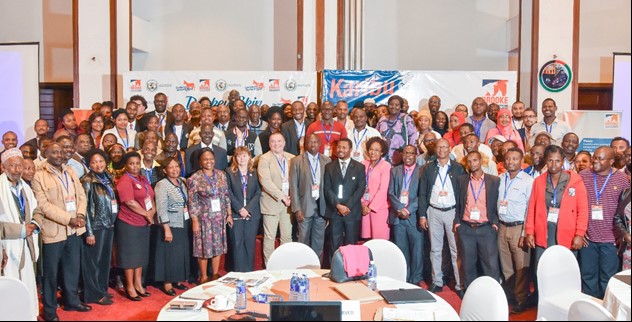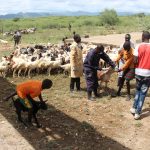The entire population of donkeys in this region is at a risk due to donkey hide trade driven by burgeoning demand from China. Kenya is the most affected in Africa particularly with licensing of four slaughter houses in Mogotio, Baringo County, Naivasha, Nakuru County, Nakwaalele Turkana County and Kithyoko, Machakos County. A 2019 study report by the Kenya Agriculture and Research Organization (KALRO) showed that over 350,000 donkeys were slaughtered in less than three years and warned that donkeys will become effectively extinct in Kenya by 2023. High demand for donkey skins has catalyzed theft, illegal slaughter and cross-border smuggling of donkeys into Kenya for slaughter thus threatening regional harmony, spread of diseases, a native donkey genetic resource and the livelihoods of communities that depend on them for service and income. Brooke East Africa and Intergovernmental Authority on Development (IGAD) devoted a special conference to review and debate the current status, socio-economic and trade impact of donkeys in Eastern Africa. The regional conference was held in Laico Regency hotel, Nairobi, Kenya from 26th to 27th November 2019. It was attended by 201 participants drawn from 13 countries including Kenya, Tanzania, Djibouti, Ethiopia, Niger, Somalia, South Sudan, Uganda, Zimbabwe, China and UK. Included too were representatives of donkey owning communities and community groups, national and local governments and government agencies, religious groups, animal welfare/ humanitarian and conservation organizations, media, academia, owners of slaughterhouses and organizations intervening on donkey welfare. The following resolutions were made:
- Collaborations and Partnerships: Given the porous nature of borders in the region, governments in the region should collaborate to find sustainable solutions including increasing investments in donkey breeding programmes as a possible long-term plan to stem the decline in donkey population to sustain the supply intended for slaughter.
- Stemming the rapid decline in donkey numbers: National and local governments of Kenya and Tanzania are urged to consider enacting legislation to ban all trade in donkey skins, meat and associated products to allow donkey population to recover from the steep decline since the slaughter begun.
- Community level support structures: It is proposed that the County (Kenya) and Regional (Tanzania) Veterinary Services from local technical committees should initiate local level policies that will operationalize the halt/ ban of donkey slaughter. In Kenya, it is suggested that the team works through intergovernmental structures such as sector working groups, County Executive CECMs caucus and Joint Agriculture sector steering committee (JASSCOM).
- Control of Cross Border Smuggling: It is suggested that the governments in the region and especially Kenya, Tanzania and Ethiopia strengthen security along their borders to curb cross border smuggling of donkeys as they pose serious risk of transmitting zoonotic diseases across countries.
- Data and Information: The proponents of the halting of the trade in donkey and donkey products undertake to collaborate to generate quality and timely data and information on the impact of donkey trade to inform decision making at local, national and regional levels.
- Global policy makers: The meeting urged regional, continental and global policy makers and advocates to lobby counterparts in the region and in countries affected by the trade to push for imposition of sanctions to mitigate the negative impacts of donkey skin trade.
- Commonality of purpose: It was proposed that security agents and communities collaborate in stemming out the rampant theft of donkeys and communities to implement initiatives to protect their animals while discouraging and reporting illegal donkey trade business.
- Community Education: It was agreed that all stakeholders will rigorously promote community awareness on donkey welfare.






